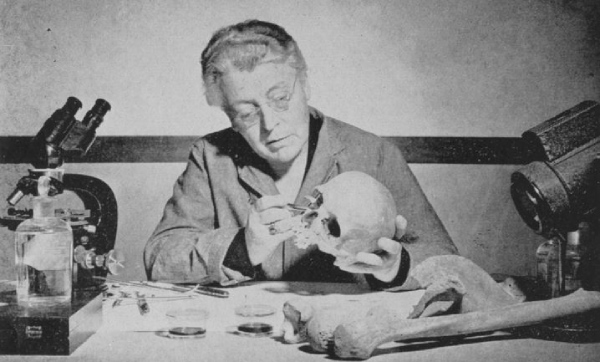Dr. Frances Gertrude McGill National Historic Person (1882–1959)

© Courtesy of Royal Canadian Mounted Police Veteran’s Association / Part of the RCMP Quarterly Collection shared by the University of Regina
Dr. Frances Gertrude McGill was designated as a national historic person in 2024.
Historical importance: remarkable forensic pathologist, physician, bacteriologist, criminologist and teacher, contributes to the advancement of forensic science in Canada, significant leadership in this field as a woman.
Commemorative plaque: no plaque installedFootnote 1
Dr. Frances Gertrude McGill (1882–1959)
Dr. Frances Gertrude McGill played a leading role in the advancement of public health and forensic science in Saskatchewan and contributed to the development of both fields in Canada as provincial bacteriologist (1918–1920), provincial pathologist (1920–1922), and then director of the Provincial Laboratories (1922–1942). After retiring from the Provincial Laboratories in 1942, she continued to help build capacity for forensic science within the Royal Canadian Mounted Police (RCMP) as the first female director of its forensic laboratory in Regina (1943–1945), and the first female honorary surgeon and consultant to the force (1946–1959).
McGill was born to a farming family in the Fairmount district of Manitoba, northwest of Minnedosa, in 1882. She attended normal school in Winnipeg and the University of Manitoba. When she graduated in 1915 with a medical degree, as one of only three women in her class, she received several awards for academic achievement. In 1918, she became provincial bacteriologist for Saskatchewan. At the Provincial Laboratories, she contributed to vaccine development and led efforts to stop the spread of sexually transmitted infections, overseeing the introduction of Wassermann tests for syphilis and analyzing samples collected by new clinics. McGill served briefly as provincial pathologist before her promotion to director of the Provincial Laboratories in 1922.
There were no dedicated forensic laboratory services in Saskatchewan at the time, so police often turned to McGill for help. In one case, her determination that a gunshot wound was self-inflicted and not evidence of murder, as the local doctor had concluded, convinced the RCMP to consult her on sudden, unnatural, and suspicious deaths. She travelled great distances to undertake post-mortem examinations, determining cause of death and providing a skilful analysis of wide-ranging biological evidence which proved critical to many cases. She became widely known for her expert testimony in court proceedings, bringing forensic pathology into the courtrooms of Saskatchewan to testify as an expert witness for the prosecution on many occasions, including on several criminal cases that became media sensations. As the RCMP started to build its own capacity for forensic science after 1937, McGill and her staff focused on public health, including screening military recruits for sexually transmitted infections during the Second World War.
“The Government of Canada’s recognition of Dr. Frances McGill’s legacy as a national historic person is of significance for one who modelled the way for women to rise to the top in non-traditional roles. When Dr. Frances McGill put down her roots in Regina, Saskatchewan, no one suspected that from this out-of-the way great plains region would emerge Canada’s first female pathologist and a pioneer in forensic medicine. Often referred to as ‘the first woman Mountie,’ she was named the first ‘Honorary Surgeon to the RCMP’ in 1946, a rare distinction as the only other woman to receive that title is her late Majesty Queen Elizabeth II.”
In 1943, McGill came out of retirement to lead the RCMP forensic laboratory in Regina until the appointment of a new director in 1945. She was the first woman in this role and, in 1946, she became the first female honorary surgeon and consultant to the force. She continued sharing her expertise with laboratory staff and police and providing officers at different stages in their careers with mandatory training in pathology, criminology, and medical jurisprudence. At the same time, she raised the profile of forensic pathology in Canada through the press coverage she attracted and served as an important example of female leadership in the decades before women gained entry into the RCMP as police officers.
This press backgrounder was prepared at the time of the Ministerial announcement in 2024.
The National Program of Historical Commemoration relies on the participation of Canadians in the identification of places, events and persons of national historic significance. Any member of the public can nominate a topic for consideration by the Historic Sites and Monuments Board of Canada.
- Date modified :